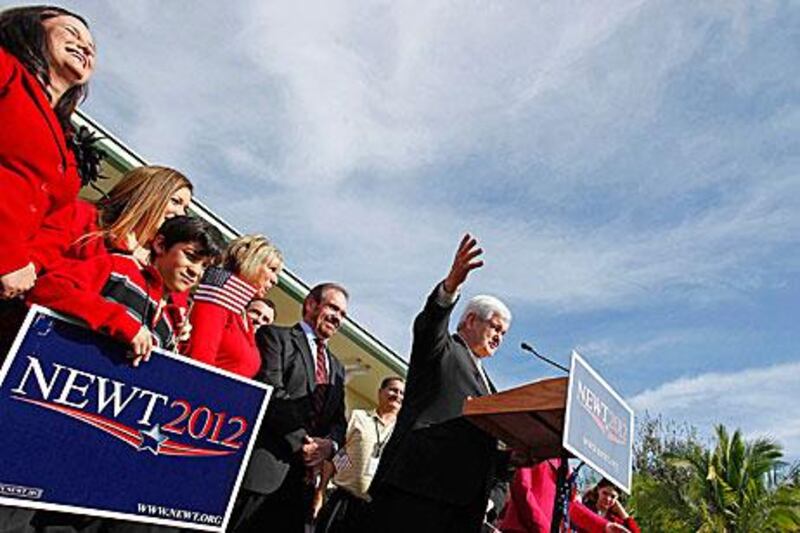WEST PALM BEACH, FLORIDA // He is known as the "philosopher king" of the Republican Party. And it is an image Newt Gingrich, who threw the Republican presidential candidate race wide open with his win in the South Carolina primary last week, likes to cultivate.
On Friday, the former leader of the US House of Representatives told his 1.4 million followers on Twitter that he was the best candidate to take on Barack Obama in November's presidential elections because America "needs big ideas, not big government".
Among those ideas: a permanent base on the moon, American energy self-sufficiency, and a balanced budget.
But it's Mr Gingrich's chequered personal life - asking his second wife to marry him before he was divorced from his first, and a six-year affair with the woman who would become his third wife - and his political record that make him a problematic presidential candidate.
Mr Gingrich is the only leader of US House of Representatives to have been disciplined for an ethics violation. In 1997 he was reprimanded and fined US$300,000 (Dh1.1 million) for tax-related offences and for giving the House of Representatives ethics committee false information.
Born Newton Leroy McPherson in 1943 to a teenage mother in Pennsylvania, Mr Gingrich was adopted in infancy by a US soldier. He earned a doctorate in Modern European history and then taught university courses in the state of Georgia before being elected to Congress in November 1978. His tenure as leader of the House from 1995-1999 was marked by the controversial "Contract with America", often derided by Democrats as a "Contract on America", in which conservative Republicans pushed for cuts in government spending and tougher crime laws.
In a battle with former president Bill Clinton over spending cuts, the federal government was shut down twice during Mr Gingrich's tenure as leader of the House, a move that outraged many taxpayers and painted Mr Gingrich as an ideologue and an obstructionist. To others, however, he was simply living up to his persona as a smaller-government advocate.
That love-him-or-hate-him image continues to this day.
Last Thursday, Mr Gingrich was the keynote speaker at the Palm Beach Republican Club's annual Lincoln Day dinner in front of a sell-out 700-strong crowd who had paid a minimum of $195 each.
But outside the pavilion where the dinner was held, a Republican voter said she was turned off by him and his politics. "I don't believe Gingrich," said Denise Orefice, 58. Ms Orefice said she was voting for Mitt Romney, the former governor of Massachusetts.
"Gingrich comes on too strong," she added with a perceptible shudder. "He turns me off."
She is not alone. The latest opinion polls have Mr Romney with a double-digit lead in Florida, where Mr Gingrich's recent setbacks include criticism from prominent Republicans questioning his conservative credentials, using his own record against him.
Mr Gingrich backed a federal government health-insurance mandate in the 1990s; he appeared with Nancy Pelosi - a leading Democrat in Congress - in 2009 to promote action against global warming; and he was paid to advise Freddie Mac, a government-sponsored mortgage investment company that taxpayers had to bail out at the height of the financial crisis in 2008.
He has, nevertheless, tapped a nerve with many conservative-leaning Republicans, who back his fervent patriotism, which is best illustrated by his foreign-policy statements. One of Mr Gingrich's mantras during the campaign has been "to produce so much energy and oil that no US president ever bows again to a Saudi King". in reference to dip Mr Obama was said to have made to a Saudi leader at 2009 meeting. He also wants to ramp up the pressure on Iran and promote regime change in communist Cuba.
He has vowed unquestioned support for Israel, repeatedly labelled Palestinians as an "invented people" and called Sharia law a "mortal threat to the survival of freedom" in the world.
He produced a documentary on radical Islam through "Gingrich Productions", a multimedia company he runs with his third wife, Callista. But it was the media's questioning of his relationship with Callista that has provided Mr Gingrich with the defining moment of the campaign so far.
On January 19 his second wife, Marianne Gingrich, told ABC News that Mr Gingrich had asked her for an open marriage, in effect seeking permission to carry on his affair with Callista.
The interview aired two days before the South Carolina primary and hours before a presidential debate on CNN at which he was immediately asked to react.
"I think the destructive, vicious, negative nature of much of the news media makes it harder to govern this country, harder to attract decent people to run for public office," he said with the slightest hint of a sneer at John King, the CNN moderator. "And I am appalled that you would begin a presidential debate on a topic like that."
It was Mr Gingrich at his strongest: unapologetic and unflinching. With a stroke, he had turned the narrative from one of his past infidelity - he later denied that he had asked for an open marriage - to one of the outsider standing up to a "media elite" conservatives in America love to hate.
It also turned the South Carolina vote for him, said Chris Wilson, a Washington-based Republican pollster.
"I can't think of anything like it in politics. Sometimes there's a back and forth between two candidates, but to see that between a moderator and a candidate … I think it was actually brilliant by Gingrich."






